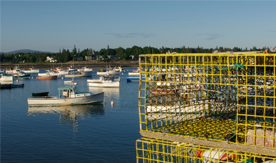
Maine Working Waterfront Expertise Featured at National Symposium
With working waterfronts continuing to feel pressure from changing fisheries, economic trends, environmental change and demographic shifts, people representing coastal interests hope to benefit from sharing common dilemmas and solutions at the third National Working Waterfronts and Waterways Symposium, March 25–28 in Tacoma, Wash.
With recognized national leadership on working waterfront issues, several Maine coastal professionals will share their expertise at the meeting.
Kristen Grant will present the results of legal research on how tax policies can help or hinder working waterfront preservation. Natalie Springuel is moderating a session on the maritime heritage of working waterfronts, during which panel of representatives from North Carolina, Florida, Washington and Maine will discuss the social and cultural aspects of working waterfronts — places where culture, history and business intersect.
Grant and Springuel are professionals with the Maine Marine Extension Team, a partnership between Maine Sea Grant and University of Maine Cooperative Extension, and serve on the conference planning committee. Both women are also founding members of the new National Working Waterfront Network, which emerged in the wake of the last national symposium (held in Maine in 2010) and was bolstered by a more than $297,600 grant from the U.S. Department of Commerce Economic Development Administration.
The grant supported a team of seven organizations across the country in researching historic trends impacting working waterfronts, analyzing the economic value of the nation’s working waterfront sectors, and gathering information on financing, law and policy tools for preserving working waterfronts and waterways. Springuel, Grant and their team will present the results of their research at the symposium, including how communities can implement tools for working waterfront preservation.
“We have great data, we have all these tools. We hope that by sharing them with symposium participants, we can figure out how they might inform the future of the National Working Waterfront Network and, more importantly, the future of the nation’s working waterfronts and waterways,” says Springuel, who is coordinating a network-wide strategy session at the symposium.
For example, working waterfront proponents realize there is a need for small, rural working waterfronts to find common ground with large ports and industrial urban waterways. While much work has been focused on the Atlantic and Gulf coasts, that knowledge and experience can inform efforts on the Pacific Coast.
Additional Maine perspectives presented by Hugh Cowperthwaite of Coastal Enterprises Inc., Nick Battista of the Island Institute and City of Portland planner Bill Needleman will highlight shared characteristics and applicability to West Coast waterfronts.
Attendees are expected to include local, regional, tribal and national decision-makers; members of the commercial fishing, marine, and tourism industries; developers and property owners; business owners; community planners; and waterfront advocates.
The symposium begins March 25 with a full day of field trips around the Tacoma waterfront and the region. More information about the symposium is online.
Contacts: Margaret Nagle, 207.581.3745/207.949.4149; Catherine Schmitt, 207.581.1434
